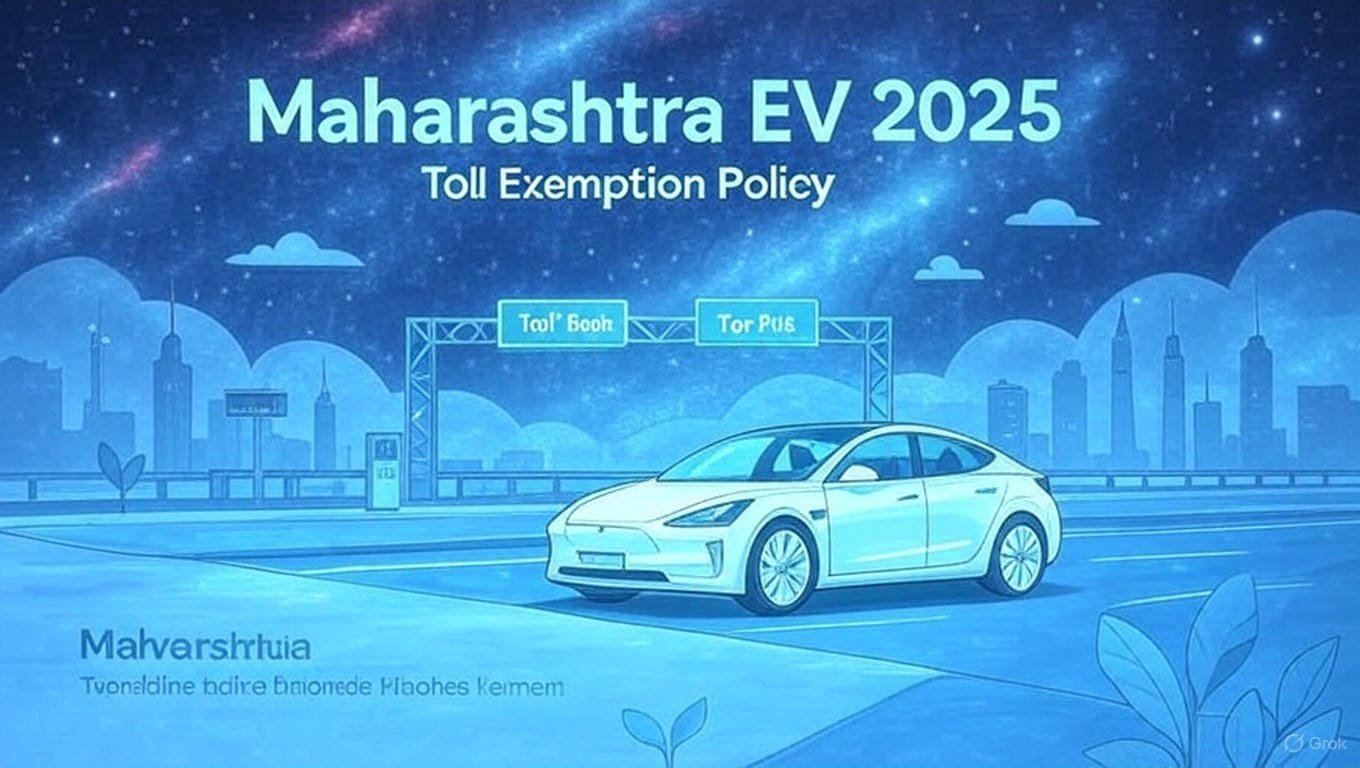Mumbai, September 5, 2025 – In a bid to accelerate the shift toward sustainable transportation, the Maharashtra government has introduced toll exemptions for electric vehicles (EVs) on key expressways as part of its ambitious Electric Vehicle Policy 2025. The initiative, aimed at reducing carbon emissions and making EVs more appealing to consumers, promises significant cost savings for owners but has faced teething troubles in rollout, with reports of continued charges at toll plazas despite official notifications.
The policy, officially notified on May 23, 2025, through Government Resolution (GR) No. MVR-0125/Pr.Kr.13/PVR-2, outlines a comprehensive framework to boost EV adoption across the state. 35 Effective from April 1, 2025, to March 31, 2030, it targets 25% EV penetration in new vehicle registrations by 2030, backed by a ₹1,993 crore budget allocation. 38 Central to the incentives is a 100% toll waiver for eligible EVs on three major corridors: the Yashwantrao Chavan Mumbai-Pune Expressway, the Hindu Hrudaysamrat Balasaheb Thackeray Maharashtra Samruddhi Mahamarg (Nagpur-Mumbai), and the Atal Bihari Vajpayee Sewri-Nhava Sheva Atal Setu (Mumbai Trans Harbour Link). 46 Additionally, EVs receive a 50% discount on other state and national highways managed by the Public Works Department. 47
Eligible vehicles include pure electric passenger four-wheelers (category M1) and buses (categories M3 and M4), encompassing both state transport undertakings and private operators. 45 However, electric two-wheelers, three-wheelers, and goods carriers are excluded from the full exemption on these routes. 47 The toll waiver on the Atal Setu, for instance, is set to last until December 31, 2025, aligning with the bridge’s initial toll levy period. 31 Officials estimate that frequent commuters, such as those traveling daily between Mumbai and Pune, could save up to ₹1 lakh annually in toll fees alone. 16
Beyond toll relief, the policy offers a suite of financial perks to spur demand. Buyers of new EVs can avail subsidies ranging from 10% for two-wheelers, three-wheelers, private four-wheelers, and buses, to 15% for goods-carrying three- and four-wheelers and electric tractors. 46 Caps apply, such as up to ₹10,000 for 1,00,000 electric two-wheelers and ₹1.5 lakh for 10,000 electric cars. 46 All EVs registered during the policy period are exempt from motor vehicle tax, registration fees, and renewal charges. 40 To support infrastructure, the state plans to install charging stations every 25 km along national highways, at all Maharashtra State Road Transport Corporation (MSRTC) bus depots, and mandate at least one fast-charging point at every fuel station through partnerships with oil companies. 46
The environmental rationale is clear: By 2030, the policy aims to cut 32 tonnes of PM 2.5 particulate matter and 1 million tonnes of greenhouse gases, contributing to cleaner air in pollution-choked urban centers like Mumbai and Pune. 47 Transport Minister Pratap Sarnaik emphasized that the move, under the guidance of Chief Minister Devendra Fadnavis and Deputy Chief Ministers Eknath Shinde and Ajit Pawar, seeks to “promote eco-friendly transport and make road travel more affordable.” 45
Despite these promises, implementation has not been seamless. The toll exemptions were slated to begin at midnight on August 22, 2025, following a specific notification from the Urban Development Department. 45 Yet, social media is abuzz with complaints from EV owners who report deductions from their FASTag accounts even after this date. For instance, one user on X (formerly Twitter) described being charged full toll at Talegaon and Khalapur plazas on August 29, 2025, tagging state officials for resolution. 0 Similar grievances date back to May and June, with drivers on the Samruddhi Expressway and Mumbai-Pune route claiming toll operators cited pending notifications from the Public Works Department or Maharashtra State Road Development Corporation (MSRDC). 1 3 10 Critics have labeled the delays a “GR fraud,” highlighting a pattern where citizen benefits lag behind announcements. 3
State authorities, including MSRDC and the National Highways Authority of India (NHAI), have been urged to update FASTag systems and train toll staff. 6 In response to queries, officials have attributed early hiccups to technical synchronization but assured swift fixes. 19 EV advocates argue that resolving these issues is crucial to building trust and achieving the policy’s goals.
As Maharashtra positions itself as a leader in India’s EV revolution—already boasting over 200,000 registered EVs—the success of this policy will hinge on effective enforcement. 38 With national targets for 30% EV sales by 2030, such state-level incentives could serve as a model, provided the gaps between policy and practice are bridged promptly.


Average Rating